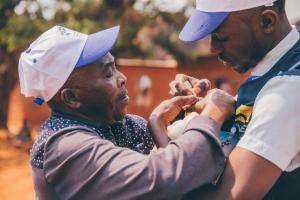Towards delivering on health goals in countries
Geneva, 6 February 2020 – The World Health Organization (WHO) has brought key health partners together to rally support for the critical functions needed in country offices to help African Members States achieve universal health coverage and the Sustainable Development Goals.
On the sidelines of the 3–8 February WHO Executive Board meeting in Geneva, the WHO Regional Office for Africa convened a high-level event on “Delivering at Country Level” on 4 February to present the outcomes of a two-year functional review process. Reviews were conducted of all 47 WHO country offices in the African Region, engaging Member States and partners in over 300 face-to-face consultations and over 700 respondents in an anonymous partner perception survey of WHO’s work in each country.
“We received consistent feedback from Member States, donors, civil society and the private sector on WHO’s performance at country level. With your support we will implement changes to strengthen our work in critical areas,” said Dr Matshidiso Moeti, WHO Regional Director for Africa, as she presented the results.
According to the results of the reviews, WHO needs to align support to country priorities, help to lead coordination in the health sector, build capacities in governance, support the functionality of district health systems, promote multisectoral approaches, and continue strengthening emergency preparedness and response.
The “Delivering at Country Level” approach envisages a 50% increase in the number of technical experts in country offices as well as a rise of 68% in new competencies – in strategic information, policy dialogue, and coordination – requiring international expertise. Implementing the results of the review process, also requires investments in leadership and managerial skills and practices in country offices. This is already underway through a regional leadership training programme – the first of its kind in WHO – which 181 mid-level and senior staff have already participated in.
Member States welcomed the approach taken by WHO. Botswana’s Ambassador to Switzerland, Her Excellency Dr Athaliah Lesiba Molokomme, said that “we can see already that WHO is more responsive, more accountable and more effective in supporting health improvements across the African continent.”
Permanent Secretary in the Ministry of Health and Child Care of Zimbabwe, Dr Agnes Mahomva, noted that “this process has given us the confidence that you [WHO] are giving us the support that we need”.
Since Dr Moeti took office in 2015, WHO Africa has been undergoing a transformative change geared towards better health for the people in the continent. The Region has seen some of the fastest declines globally in TB incidence. More people are getting tested for HIV, two out of three are getting treatment and half are achieving viral suppression with no risk of infecting other people.
Response to health emergencies by WHO Africa is increasingly faster, more coordinated and more effective. Information sharing with the public and key stakeholders on emergencies is also getting better.
Several countries are working towards malaria elimination and efforts being stepped up in high burden countries to ensure gains made are not reversed.
With the “Delivering at Country Level” initiative, WHO is promising improved service delivery; accountability; efficiency; engagement; transparency; efficient use of resources, putting people at the centre of its work and ensuring flexible funding for critical functions.
WHO is requesting countries and partners to align their support with the outcome of the functional review, carry out joint advocacy and collaboration to achieve universal health coverage, the Sustainable Development Goals and strengthen health security.
Some US$ 270 million are required for the critical functions. WHO has committed up to US$ 122 million of flexible funding towards the realization of these thematic functions.



